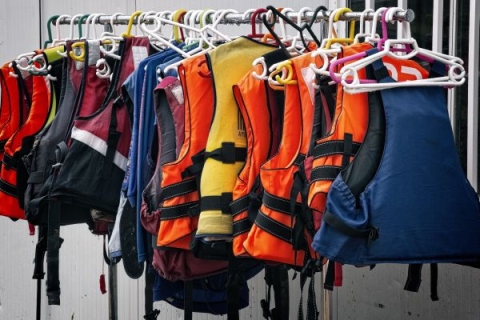

The findings are published as part of Maritime Safety Week, which aims to highlight ways in which people can stay safe at sea and along the coast.
6 July 2021
2 min read
Sixteen people’s lives might have been saved in 2020 if they had been wearing a lifejacket or buoyancy aid, according to new findings.
In 2020, 50 per cent of the 32 cases reviewed by the Casualty Review Panel concluded that a lifejacket could have saved a life.
This figure is slightly higher than the most recent figure of 11 lives (out of 22 fatalities) but is likely to reflect an increased incident count as a result of larger visitor numbers at our coasts last year.
The Casualty Review Panel, consisting of members from the Maritime and Coastguard Agency (MCA), Maritime Accident Investigation Branch (MAIB), RNLI, maritime industry, academia and sports governing bodies, meets once a year to discuss the circumstances surrounding fatal maritime incidents and makes a judgement about whether a lifejacket or buoyancy aid might have saved a person’s life. According to the Panel, over the past 14 years, more than 200 lives could have been saved by wearing a lifejacket or buoyancy aid.

The panel has been a tremendous force for improving water safety by highlighting the importance of lifejacket use, as well as producing important water safety messages and specific messages for groups such as rock fishermen, canoeists and stand up paddle boarders.
Professor Mike Tipton, Professor of Human and Applied Physiology
Professor Mike Tipton from the University of Portsmouth has sat on the MCA Casualty Review Panel since its inception 14 years ago. He provides the physiological input to the Panel in the area of survival in water. The Panel review immersion incidents each year to determine if lifejacket use would have improved the outcome.
He said: "In the ten years leading up to 2016, it is estimated that a life was lost unnecessarily in water every three weeks due to the failure to wear a lifejacket. The panel has been a tremendous force for improving water safety by highlighting the importance of lifejacket use, as well as producing important water safety messages and specific messages for groups such as rock fishermen, canoeists and stand up paddle boarders."
The findings are published as part of Maritime Safety Week, which aims to highlight ways in which people can stay safe at sea and along the coast and raise awareness of the dangers of the water.
Recommendations from the panel echo this year’s key safety messages:
- Wear a lifejacket or buoyancy aid appropriate to your activity – it will greatly improve your chances of surviving the shock of entering cold water.
- Check the weather and tides.
- Carry a means of calling for help, a personal locator beacon, phone or radio.
- Wear bright, colourful clothing that helps you to be seen in the water.
This year the panel mentioned that responsible alcohol consumption, in addition to lifejacket/buoyancy wear, is important in ensuring safety. It is also vital people wear a lifejacket correctly, that it is properly fitted, well maintained with a light, sprayhood and a crotch strap.
